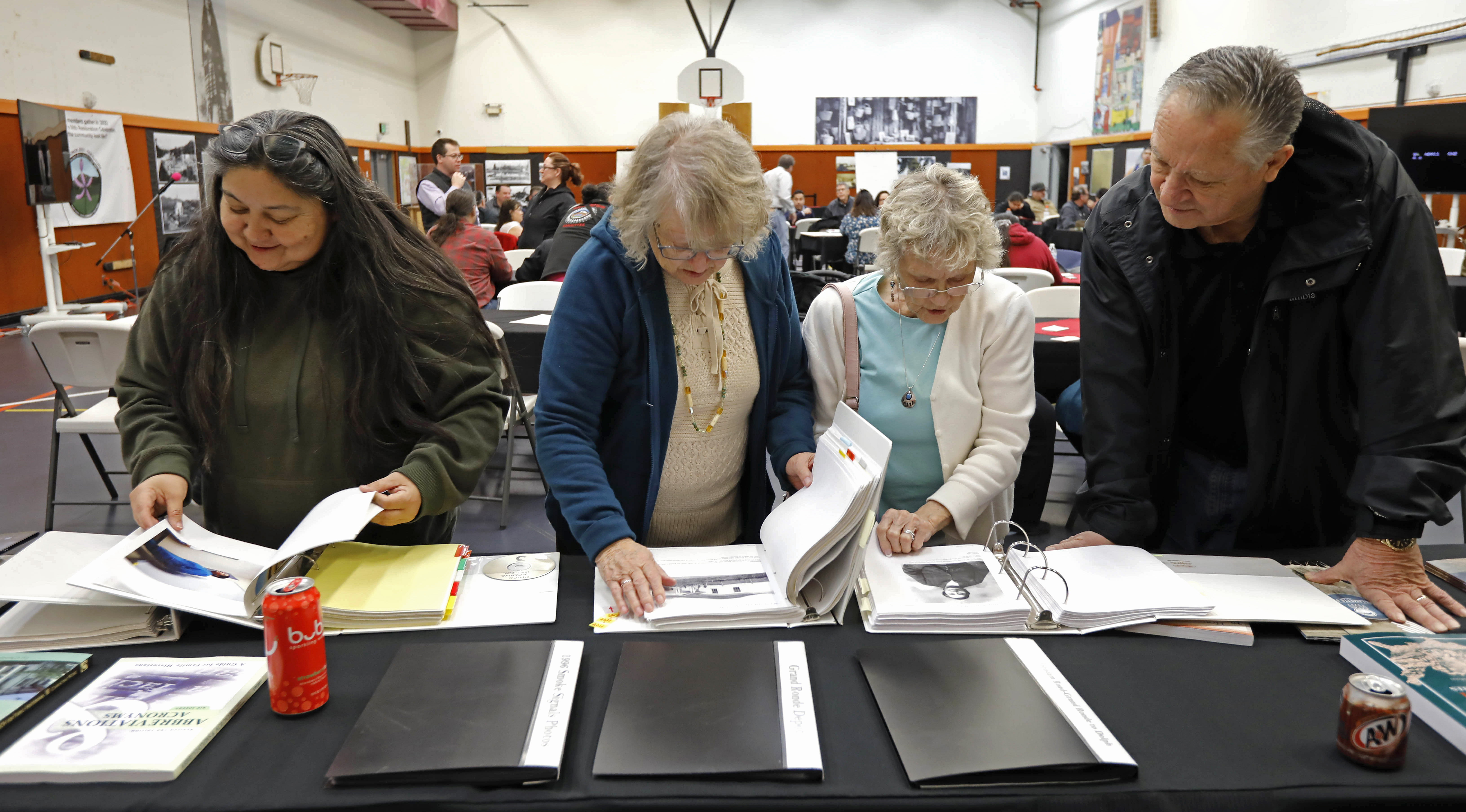Tribal Government & News
Event examines how Grand Ronde's past informs its future development

By Danielle Frost
Smoke Signals staff writer
What Grand Ronde used to be and how it compares to what residents want it to look like in 2033 was the topic of the third listening session held on Wednesday, Feb. 26, at Chachalu Museum & Cultural Center.
The 50th anniversary of the Grand Ronde Tribe’s Restoration is less than 15 years away and Tribal government is already inquiring of the membership what they want the Grand Ronde community to look like then.
“We can’t continue this plan without asking, ‘What did Grand Ronde used to be like?’ ” Planning Director Rick George said. “We are halfway through the planning process so tonight we will talk about Grand Ronde in the context of how it was and where we are going in the future.”
The Tribe launched the shawash-iliʔi 2033- nsayka kʰapa aɫqi (Grand Ronde 2033 – Our Future) effort in May. The 16-month community development planning process will help guide the decisions and setting of priorities for the Tribe as the 50-year mark approaches.
Cultural Resources Manager David Harrelson welcomed attendees. Then he, Cultural Advisor Bobby Mercier and Tribal member Nokoa Mercier led a drum song.
After a dinner of salmon, steak, green beans and cupcakes, Harrelson spoke about the Grand Ronde Town History Project. The Chachalu Collections and Archives team is spearheading the effort to help in reconstructing a collective story map of the community across decades so that it can shared with future generations. They are seeking old film, photo negatives, video and home movies.
“All of the images you see here tonight got here because people have donated them to the museum,” Harrelson said. “You may think we have a lot, but we don’t think we have enough.”
Harrelson added that some of the items, such as VHS tapes and photos, deteriorate or can be lost over time, so creating digital copies will ensure preservation. All original items will be returned to the owner.
Harrelson, Chachalu Manager Julie Brown, Cultural Center Specialist Rachelle Kellogg and several other staff members helped organize the evening’s event by displaying old photographs throughout the gym. They also filled tables with copies of Tribal treaties, Elder oral histories, books and digital photo archives.
Then, satellite imagery of the area was shown to the audience while Harrelson narrated. It began with a photo of the Uyxat Powwow Grounds arbor. The “fly through” video was also interspersed with historic photos of Spirit Mountain Casino construction, a commercial building, Kissing Rock, timber workforce housing, original maps of the Reservation, Elder housing construction, the plankhouse, Health & Wellness Center construction and Tribal housing.
“All of this information and life experience has come about from the past and the present, with different historical photos as they relate to it,” Harrelson said.
He explained the different eras of change for Grand Ronde, which included relocation, Fort Yamhill and the Grand Ronde Agency, the timber era of “new” Grand Ronde, Termination and timber collapse, and Restoration.
Then, the approximately 50 attendees sitting at several tables offered their suggestions on five main topics while facilitators captured their myriad ideas on large sheets of paper. The topics included reactions to seeing historical images of Grand Ronde, potential items they or family members have that could be shared with the Tribal museum, archival and research needs that were needed for the Tribe, historical events in Grand Ronde that could help shape the future and past events that should be discussed further.
Staff members who attended and participated in the discussions included General Manager David Fullerton, Education Department Manager Angela Fasana, Human Resources Manager Camille Mercier, Housing Department Manager Shonn Leno, former Tribal Historian David Lewis, former longtime Tribal Council Chair Reyn Leno, former Tribal Council member Ed Larsen, Higher Education Program Manager Bryan Langley, Natural Resources Department Manager Michael Wilson, Spirit Mountain Community Fund Director Michael Cherry and Early Childhood Education Program Manager Angie Blackwell.
Tribal Council members Kathleen George, Michael Langley and Lisa Leno also attended.
Blackwell said her group had “great conversations” about the various table discussion topics.
“But when it came down to it, we want to build a community where people feel welcome,” she said. “The consensus was that people don’t feel as if they belong or are welcomed.”
Suggestions from other tables included having a grocery store, movie theater, more recreational opportunities, diversifying the economy and building a strip mall.
Harrelson closed the meeting by telling attendees that the evening was a “really great opportunity.”
“This is really meaningful,” he said. “It’s not the first development plan the Tribe has done, but it is the most productive because the community is really participating in the process.”
Subjects discussed in previous listening sessions were Housing, Public Safety, Needed Services and Recreation, Facilities and Gathering Spaces, Health Care, Social Services, Education, and Employment and Vocational Training.
Input from community meetings will be compiled and developed into a summary report, with goals and priorities put into a plan that will be taken to Tribal Council and Tribal administration for possible implementation.
For more information about the community development process, visit the Tribal government’s website at www.grandronde.org, e-mail grandronde2033@grandronde.org or call 503-879-2112.
